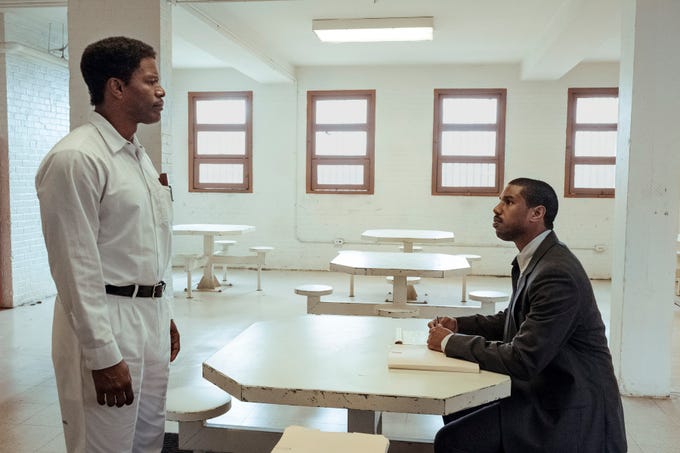
Directed by: Destin Daniel Creighton
Starring: Michael B. Jordan, Jamie Foxx, Brie Larson, O'Shea Jackson, Jr., Tim Blake Nelson, Rafe Spall, Rob Morgan
Just Mercy is based on a true story, but feels a lot like other movies which have covered the same ground. It is a bland, muted treatment of a story of social injustice which sticks too close to formula. Just Mercy feels too safe, as if it is holding its outrage in reserve for a sequel.
The movie begins in 1986 rural Alabama, where Walter McMillian (Foxx) is arrested for a murder of an eighteen-year-old white woman. Thanks mostly to testimony from a sketchy witness (Nelson), Walter is convicted and sentenced to death. Five years later, Harvard law grad Bryan Stevenson (Jordan) opens up a law center in Alabama for poor people who can't afford a strong legal defense. Walter, along with a few other death row inmates, become Bryan's first clients. Bryan is assisted by Eva Ansley (Larson), whose primary function is to receive phone calls at home from wacko racists spewing hatred and bomb threats.
Another of Bryan's clients is Herbert Richardson (Morgan), who unlike Walter is guilty of setting off a bomb which killed a woman. He is a Vietnam veteran who suffers from PTSD, a fact not brought up in his trial. Morgan's performance is the best in the movie as a man suffering from guilt and trauma whose eventual execution provides the most powerful and emotional moments of Just Mercy.
Once Herbert leaves the scene, we are drawn back into the predictable main event, in which Bryan works nonstop to prove Walter's innocence, which can be proven if the shaky, scared witness from the first trial can be trusted to recant his original testimony at great expense to himself. Tim Blake Nelson's performance leans so heavily on physical and facial tics that it borders on distracting. Who in a million years would ever find this guy credible?
Does Bryan himself experience subtle and (sometimes not-so-subtle) racism in the form of strip searches, brush offs by the local DA, and unnecessary traffic stops by white cops? Through it all, Bryan maintains a stoic face, almost because he knows he has to keep a stiff upper lip in order to win the case in a South still trying to grasp the concept of civil rights.
Just Mercy never stirs our souls enough to feel any catharsis or joy when justice is finally served. Bryan triumphs in this case over a system in which Walter describes as "you're guilty the day you are born," Just Mercy only superficially explores that theme, and does it strike anyone as odd that Walter, despite growing up poor in rural Alabama, has perfectly straight white teeth?
No comments:
Post a Comment